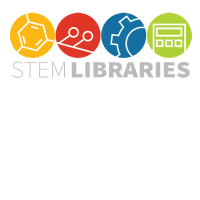These resources offer specialty materials you may need for some STEM activities:
Arbor Scientific is a leading provider of Physics and Physical Science teaching equipment tested and approved by educators recognized for their expertise. We work with teachers at all levels to find the ‘Cool Stuff’ – unique demonstration and laboratory tools – and then provide lesson plans, supportive teaching guides and science teaching supplies to make each learning experience fun and effective.
Modified, ready-to-use telescopes for libraries.
Teachers Serving Teachers: Shop by Subject or grade level for your STEM library programs. Get inspired by some of the affordable stuff and lessons plans that are free to download.
Supplies for science fairs are also transferrable to library programs. Need a low cost solar cell? PH paper strips? Mini light bulbs? This is the place.
Search these collections for activities you can deliver online or in person at your library:
by Eric H. Chudler at the University of Washington
Utah Genetic Science Learning Center
Learn Genetics from the University of Utah Genetic Science Learning Center
(Does require Flash to run)
Cornerstones provides customized assistance helping librarians connect with appropriate scientists and create programs tailored to their unique setting and audiences.
Culture of Innovation: Culture and Change Management for Libraries
A presentation to IMLS by Christa Werle, Public Services Project Manager, Service Center, Sno-Isle Libraries, June 2016.
Expect More: Why Libraries Cannot Become STEM Educators
by R. David Lankes. Public Libraries & STEM: A National Conference on Current Trends and Future Directions, August 2015.
From Tug of War with Time
from the Office of the Pima County [Arizona] School Superintendent
Best STEM Resources for NextGen Scientists, The Essential Selection and User’s Guide
by Jennifer L. Hopwood
Edited by Vera Gubnitskaia and Carol Smallwood
Invent to Learn: Making, Tinkering, and Engineering in the Classroom
by Sylvia Libow Martinez & Gary Stager
Decoding the Digital Girl: Supporting and Defining Girls’ Digital Leadership (2019)
The Girl Scout Research Institute recently conducted national research with nearly 2,900 girls and boys ages 5–17 and their parents to better understand the digital experiences of girls and their use of technology to lead in their own lives and beyond.
Informal Science.org provides a brief overview of resources on InformalScience.org that describe and support the intersection between libraries and STEM learning, as well as links to other relevant resources and communities.
To build support for afterschool and summer informal STEM, you’ve got to answer the questions: Why does it matter? How does it work? If it’s not working, why not? And what can we do about it? Think of these talking points as a set of go-to topic sentences, which you can expand upon for specific communications formats and audiences. Copy them word-for-word or adapt them, but when adapting, take care to maintain core elements in each.
FrameWorks: Beyond School Bells
The following talking points can be used flexibly – as a source of themes for longer written pieces, as short responses in media interviews or public appearances, or as set-ups to “pre-frame” a conversation on specific policy or program proposals. All of these can and should be embellished in multiple ways, drawing attention to details of programs and policies that flow naturally from these priming statements. Each talking point pulls from rigorously tested messages that have been shown to shift thinking away from common but unproductive ways of thinking about education, and to build the public’s support for more effective approaches to teaching and learning. They need not be used word for-word, but when adapting, communicators should take care to maintain the core frame elements in each.
Exposure to formal and informal learning in STEM subjects, beginning at an early age and continuing through high school, prepares our nation’s students for the future ahead. Supporting quality science, technology, engineering, and mathematics education for all children and youth is therefore vital to our country’s social and economic prosperity. This brief summarizes what we know, what we are still striving to learn, and what we must do through public policy to achieve this goal.
Why We Need to Improve Science, Technology, Engineering, and Mathematics (STEM) Education
The U.S Chamber of Commerce Foundation has compiled talking point around STEM Education

Libraries large and small are becoming essential hubs of STEM education for people of all ages. Through free access to the internet, computers, tablets, books, DVDs, workshops and programming, libraries remove barriers to STEM literacy and inquiry. These services are especially vital for children and youth whose families might not have the means for extracurricular STEM enrichment opportunities.

© STEMLibraries.org • Get in touch: stemlibraries@gmail.com